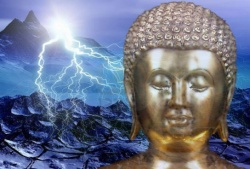Difference between revisions of "Cheng Weishi Lun"
| Line 1: | Line 1: | ||
[[File:282 medium.jpg|thumb|250px|]][[File:29ukkkphics.jpg|thumb|250px|]] | [[File:282 medium.jpg|thumb|250px|]][[File:29ukkkphics.jpg|thumb|250px|]] | ||
<poem> | <poem> | ||
| − | [[Cheng Weishi Lun]] ({{Wiki|Chinese}}: [[成唯識論]]; pinyin: [[Chéng Wéishì Lùn]]), or "[[Discourse on the Perfection of Consciousness-only]]," is a comprehensive {{Wiki|discourse}} on the central teachings of [[Yogacara]], framed around [[Vasubandhu's]] seminal [[Yogacara]] work Triṃśikā-vijñaptimātratā ("Thirty Verses on [[Consciousness-only]]"). It was written by the {{Wiki|Chinese}} [[monk]] [[Xuanzang]] in the 7th century CE. It is sometimes referred to as [[Vijñaptimātratāsiddhi]], its {{Wiki|equivalent}} [[name]] in [[Sanskrit]]. | + | |
| + | |||
| + | |||
| + | |||
| + | |||
| + | |||
| + | |||
| + | [[Cheng Weishi Lun]] ({{Wiki|Chinese}}: [[成唯識論]]; pinyin: [[Chéng Wéishì Lùn]]), or "[[Discourse on the Perfection of Consciousness-only]]," is a comprehensive {{Wiki|discourse}} on the central teachings of [[Yogacara]], framed around [[Vasubandhu's]] seminal [[Yogacara]] work [[Triṃśikā-vijñaptimātratā]] ("Thirty Verses on [[Consciousness-only]]"). It was written by the {{Wiki|Chinese}} [[monk]] [[Xuanzang]] in the 7th century CE. It is sometimes referred to as [[Vijñaptimātratāsiddhi]], its {{Wiki|equivalent}} [[name]] in [[Sanskrit]]. | ||
Origins and importance | Origins and importance | ||
| − | When [[Xuanzang]] was studying [[Buddhism]] in [[India]] at [[Nālandā]] {{Wiki|University}}, he discovered ten commentaries on [[Vasubandhu's]] [[Triṃśikā-vijñaptimātratā]]. He drew upon these commentaries, especially the commentary of [[Dharmapāla]], when [[writing]] his own detailed explanation of the [[Triṃśikā-vijñaptimātratā]], which became the [[Cheng Weishi Lun]]. | + | When [[Xuanzang]] was studying [[Buddhism]] in [[India]] at [[Nālandā]] {{Wiki|University}}, he discovered ten commentaries on [[Vasubandhu's]] [[Triṃśikā-vijñaptimātratā]]. He drew upon these commentaries, especially the commentary of [[Dharmapāla]], when [[writing]] his [[own]] detailed explanation of the [[Triṃśikā-vijñaptimātratā]], which became the [[Cheng Weishi Lun]]. |
The [[Cheng Weishi Lun]] became one of the key texts of the [[Faxiang]] ({{Wiki|Chinese}} [[Yogacara]]) school, and is also frequently quoted in the writings of [[Hossō]] ([[Japanese]] [[Yogacara]]) school, where it is referred to as the [[Jōyuishikiron]]. | The [[Cheng Weishi Lun]] became one of the key texts of the [[Faxiang]] ({{Wiki|Chinese}} [[Yogacara]]) school, and is also frequently quoted in the writings of [[Hossō]] ([[Japanese]] [[Yogacara]]) school, where it is referred to as the [[Jōyuishikiron]]. | ||
English translations and {{Wiki|scholarship}} | English translations and {{Wiki|scholarship}} | ||
| − | [[Wei Tat]] translated the [[Ch'eng Wei-Shih Lun]] into English for the first [[time]] in [[Hong Kong]] in 1973. This translation is based upon Louis de La [[Wikipedia:Louis de La Vallée-Poussin|Vallée Poussin's]] early translation of the [[Cheng Weishi Lun]] into {{Wiki|French}} ([[Vijñaptimātratāsiddhi]]: La [[Siddhi]] de [[Hiuan-Tsang]]). Wei's translation is now out of print and difficult to find. More recently, {{Wiki|Francis Cook}} made a new English translation of the text for the Numata Center's [[Taisho Tripitaka]] translation [[effort]]. | + | [[Wei Tat]] translated the [[Ch'eng Wei-Shih Lun]] into English for the first [[time]] in [[Hong Kong]] in 1973. This translation is based upon Louis de La [[Wikipedia:Louis de La Vallée-Poussin|Vallée Poussin's]] [[early translation]] of the [[Cheng Weishi Lun]] into {{Wiki|French}} ([[Vijñaptimātratāsiddhi]]: La [[Siddhi]] de [[Hiuan-Tsang]]). Wei's translation is now out of print and difficult to find. More recently, {{Wiki|Francis Cook}} made a new English translation of the text for the Numata Center's [[Taisho Tripitaka]] translation [[effort]]. |
To date, the following English translations of the [[Cheng Weishi Lun]] have been rendered: | To date, the following English translations of the [[Cheng Weishi Lun]] have been rendered: | ||
Wei Tat, [[Ch'eng Wei-Shih Lun]]: [[Doctrine of Mere-Consciousness]], Hardcover. 1973 ISBN unknown | Wei Tat, [[Ch'eng Wei-Shih Lun]]: [[Doctrine of Mere-Consciousness]], Hardcover. 1973 ISBN unknown | ||
| − | Francis H. Cook, Three Texts on [[Consciousness Only]], Hardcover. 1999 ISBN 1-886439-04-4 | + | [[Francis]] H. Cook, Three Texts on [[Consciousness Only]], Hardcover. 1999 ISBN 1-886439-04-4 |
[[Dan Lusthaus]] of the {{Wiki|University of Missouri}} has written a {{Wiki|modern}} commentary on the [[Cheng Weishi Lun]]. | [[Dan Lusthaus]] of the {{Wiki|University of Missouri}} has written a {{Wiki|modern}} commentary on the [[Cheng Weishi Lun]]. | ||
Latest revision as of 15:50, 26 December 2023
Cheng Weishi Lun (Chinese: 成唯識論; pinyin: Chéng Wéishì Lùn), or "Discourse on the Perfection of Consciousness-only," is a comprehensive discourse on the central teachings of Yogacara, framed around Vasubandhu's seminal Yogacara work Triṃśikā-vijñaptimātratā ("Thirty Verses on Consciousness-only"). It was written by the Chinese monk Xuanzang in the 7th century CE. It is sometimes referred to as Vijñaptimātratāsiddhi, its equivalent name in Sanskrit.
Origins and importance
When Xuanzang was studying Buddhism in India at Nālandā University, he discovered ten commentaries on Vasubandhu's Triṃśikā-vijñaptimātratā. He drew upon these commentaries, especially the commentary of Dharmapāla, when writing his own detailed explanation of the Triṃśikā-vijñaptimātratā, which became the Cheng Weishi Lun.
The Cheng Weishi Lun became one of the key texts of the Faxiang (Chinese Yogacara) school, and is also frequently quoted in the writings of Hossō (Japanese Yogacara) school, where it is referred to as the Jōyuishikiron.
English translations and scholarship
Wei Tat translated the Ch'eng Wei-Shih Lun into English for the first time in Hong Kong in 1973. This translation is based upon Louis de La Vallée Poussin's early translation of the Cheng Weishi Lun into French (Vijñaptimātratāsiddhi: La Siddhi de Hiuan-Tsang). Wei's translation is now out of print and difficult to find. More recently, Francis Cook made a new English translation of the text for the Numata Center's Taisho Tripitaka translation effort.
To date, the following English translations of the Cheng Weishi Lun have been rendered:
Wei Tat, Ch'eng Wei-Shih Lun: Doctrine of Mere-Consciousness, Hardcover. 1973 ISBN unknown
Francis H. Cook, Three Texts on Consciousness Only, Hardcover. 1999 ISBN 1-886439-04-4
Dan Lusthaus of the University of Missouri has written a modern commentary on the Cheng Weishi Lun.

